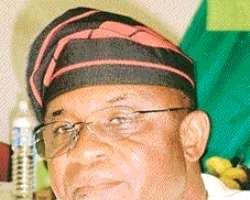SENATE PASSES HARMONISED ELECTORAL ACT

Mark
All legal provisions being worked on for the successful conduct of 2011 elections were completed yesterday when the Senate finally passed the harmonized version of the 2010 Electoral Act. The law, among other things, outlaws the use of affirmative action by parties for the selection of candidates for elections.
In other words, no adoption of candidates as all contestants are expected to scale primaries before becoming party candidates.
The eventual passage, followed the unanimous adoption of the report of the Joint National Assembly Conference Committee, which harmonized the differences in the versions passed by both chambers of the federal legislature.
The new electoral law, which is now ready for transmission for presidential assent, also gives the Independent National Electoral Commission (INEC) longer time to prepare for the 2011 elections as it moved the period for the completion of registration of voters from the existing 120 days before elections to 60 days as requested by the commission.
This gives INEC leverage to carry out voters' registration up to November to complete the compilation of the register.
The legislature retained section 25 of the old law in the new amendment which now fixes the election of the President before that of governors, despite pressure by some state chief executives to reverse the arrangement. The passed Act, whose report was presented by the Senate Whip, Kanti Bello, shows that section 87 outlaws affirmative action at primaries as it provided strictly for compulsory balloting at primary elections by parties with prescription that only aspirants with highest number of votes cast will be forwarded to INEC as candidates for the main elections.
To further ensure internal democracy in parties, the new law bars the use of courts to stop the conduct of primaries and restricted the replacement of candidates by primaries except on the ground of death.
Increasing the limits of spending for election, section 91 of the new law pushed up expenses for presidential election from N500 million to N1 billion, and that of governors from N100 million to N200 million.
It also pegged the maximum election expenses for National Assembly at N40 million for Senate and N20 million for House of Representatives and provides for N10 million for state Assembly, N10 million for local government chairman and N1 million for councillors.
Despite pressure from some governors, the National Assembly maintained its position on the new order of election, fixing that of the president ahead of the governors.
The new election order provides that the 2011 elections will start with the National Assembly, followed by the presidential and then governorship and state Assemblies. It was gathered that governors, especially those from the opposition parties, had last week mounted pressure on the leadership of the National Assembly to reverse the order of the election so as to place the election of governors ahead of that of the President, following fears that conducting the presidential election first will give the ruling Peoples Democratic Party (PDP) undue advantage over other parties in the event of the party winning the presidency.
